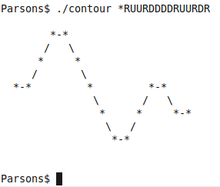Parsons code
The Parsons code, formally named the Parsons code for melodic contours, is a simple notation used to identify a piece of music through melodic motion—the motion of the pitch up and down. Denys Parsons developed this system for his 1975 book The Directory of Tunes and Musical Themes. Representing a melody in this manner makes it easy to index or search for particular pieces.
The book was also published in Germany in 2002 and reprinted by Piatkus as The Directory of Classical Themes in 2008.

Parsons Code of Ode to Joy
The code
The first note of a melody is denoted with an asterisk (*), although some Parsons code users omit the first note. All succeeding notes are denoted with one of three letters to indicate the relationship of its pitch to the previous note:
- * = first tone as reference,
- u = "up", if the note is higher than the previous note,
- d = "down", if the note is lower than the previous note,
- r = "repeat", if the note has the same pitch as the previous note.
Some examples
 |
Twinkle Twinkle Little Star
Tune for Twinkle Twinkle Little Star |
| Problems playing this file? See media help. | |
- "Twinkle Twinkle Little Star": *rururddrdrdrd urdrdrdurdrdrd drururddrdrdrd
- "Silent Night": *udduuddurdurdurudddudduruddduddurudduuddduddd
- "Aura Lea" ("Love Me Tender"): *uduududdduu
- "White Christmas": *udduuuu
- First verse in Madonna's "Like a Virgin": *rrurddrdrrurdudurrrrddrduuddrdu
- First verse in "We Are the World": *rduduururdrddrududuu
See also
References
- "The Parsons Code for Melodic Contours". Musipedia.
- Parsons, Denys (1975). The Directory of Tunes and Musical Themes. S. Brown. ISBN 0-904747-00-X.
- Parsons, Denys (2002). The Directory of Tunes and Musical Themes. Bohmeier. ISBN 3-89094-370-5.
- Parsons, Denys (2008). The Directory of Classical Themes. Piatkus. ISBN 978-0-7499-5178-8.
- "Was Parsons right? An experiment in usability of music ..." (PDF). ismir 2003.
External links
- Themefinder allows searching musical themes by Parsons Code (called "Gross Contour" on the search page).
- "The Open Music Encyclopedia" uses Parsons code for encoding songs in their database
- FolkTuneFinder.com uses Parsons code (amongst other methods) to search a database of folk tunes.
This article is issued from Wikipedia - version of the 11/27/2016. The text is available under the Creative Commons Attribution/Share Alike but additional terms may apply for the media files.